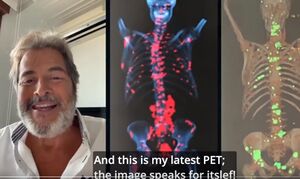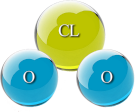Amazing Recovery from prostate cancer
Overcoming Advanced Prostate Cancer: The Role of CDS in Patient Recovery
by Dr. M. Aparicio
Link : Video testimony
Introduction
Advanced prostate cancer poses significant challenges to patients, particularly when metastases are present. The journey to recovery can be fraught with difficulties, yet stories of resilience and innovative treatments provide hope. This article examines a remarkable case involving a courageous patient who successfully navigated advanced prostate cancer, utilizing a novel therapeutic approach known as CDS (Cell-Derived Solutions).

Patient Background
In October 2019, a 64-year-old male patient from Mexico, with no significant medical history, underwent a routine prostate examination that indicated abnormal prostate antigen levels (> 10 ng/ml). Shortly thereafter, he experienced bleeding in his urine and semen, leading to a diagnosis of metastatic prostate cancer confirmed through a prostate biopsy and positron emission tomography. In February 2020, the patient opted out of chemotherapy and immunotherapy, instead choosing a metabolic therapy involving daily intravenous infusions of the glucose analogue 2-deoxy-D-glucose (2DG) for a duration of 2.5 months. He also adhered to a ketogenic diet and practiced intermittent fasting for 20 hours daily. Throughout the treatment, the patient did not experience significant side effects.
The patient, diagnosed with advanced prostate cancer, faced a daunting prognosis due to the presence of metastases throughout the body. Traditional treatment options, including hormonal therapy and chemotherapy, often yield limited success in such cases. However, through a combination of determination and the adoption of CDS, this patient was able to pursue a different path toward recovery.
Challenges Faced
Confronted with the physical and emotional toll of cancer, the patient experienced numerous challenges. These included managing pain, coping with the side effects of conventional treatments, and grappling with the psychological impacts of a cancer diagnosis. Throughout this difficult period, the patient remained committed to exploring all available options for treatment.
The Role of CDS
CDS is an innovative therapeutic approach that harnesses the body's own cellular mechanisms to combat disease. In this case, the patient underwent a regimen involving CDS, which is believed to enhance the immune response and promote healing. The treatment focused on:
- Cellular Regeneration: By utilizing the body’s own cells, CDS aims to repair damaged tissues and support overall health.
- Immune Modulation: CDS may help in modulating the immune system to better recognize and attack cancer cells.
- Personalized Treatment: Each patient’s treatment is tailored to their unique biological makeup, potentially increasing the effectiveness of therapy.
Positive Outcomes
As the patient progressed through the CDS regimen, significant improvements were observed. Regular assessments demonstrated:
- Reduction in Tumor Size: Imaging studies indicated a marked decrease in the size of metastatic lesions.
- Improved Quality of Life: The patient reported enhanced energy levels and a reduction in pain, allowing for a more active lifestyle.
- Psychological Resilience: The combination of physical improvement and supportive care contributed to a more positive outlook on life.
Conclusion
The inspiring story of this patient highlights the potential benefits of CDS in treating advanced prostate cancer. While traditional therapies have their place, innovative approaches like CDS offer hope for those facing similar diagnoses. This case serves as a reminder of the importance of perseverance and the continuous search for effective treatments in oncology.
Future research is essential to further understand the mechanisms behind CDS and its efficacy across various cancer types. Continued exploration may lead to improved outcomes for patients battling advanced cancer, ultimately enhancing their quality of life and chances for recovery.
